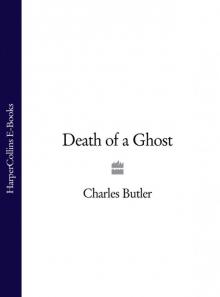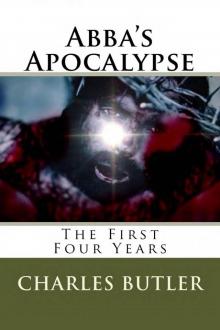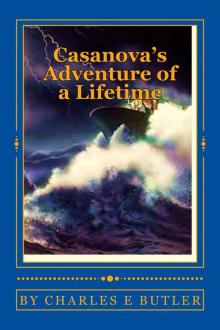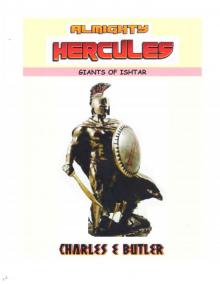- Home
- Charles Butler
Death of a Ghost
Death of a Ghost Read online
CHARLES BUTLER
Death of a Ghost
Illustrated by David Wyatt
For Hallie Óg
Epigraph
Now like Friar Bacon’s Brazen Head I’ve spoken “Time is,” “Time was,” “Time’s past.”
Byron, Don Juan
Contents
Cover
Title Page
Dedication
Epigraph
One
Two
Three
Keep Reading
Other Works
Copyright
About the Publisher
One
IT WAS A hot day in August and Jack Purdey was taking the lanes too fast. Jack always drove like that, but today it was worse because the lanes were narrower and he was nervous about Lychfont. Untrimmed hedges flicked the wing mirror and strips of yellow hit the windscreen as a tractor flung back straw. Watching from the passenger seat, Ossian saw his father’s profile turn hooked and mean, like a bird of prey in mid-swoop.
Will I have ear hairs when I’m fifty? Ossian wondered. He said nothing, but at each corner braced his foot against the floor.
Jack saw this at last and pointed out in his hurt voice: “We’ll be late if I don’t put a spurt on.”
“We’ll probably be late if you do, Dad. Kaput. Worm-food.”
“Huh. Morbid child. We want to make a good impression, you know.”
A milk tanker pulled out from a gate at this moment and forced them to the edge of a ditch. Jack swore inventively, but he drove with greater caution after that.
All this for Catherine Frazer! thought Ossian. She won’t even notice.
Ossian tried to distract himself by reading the book his girlfriend Lizzy had given him. It was a hardback novel with 300 pages of close-set print: Death of a Mayfly. Lizzy had slipped it into his hand at Philadelphia International, just before the departure lounge. “For the trip. It’s the latest Inspector Gordius.”
Nice thought, reflected Ossian. He’d felt bad because he’d bought her nothing in return. Not that she’d seemed to mind.
“Just don’t forget me, will you?” she had told him.
The small print made him queasy though, and the plot – some double-cross, triple-bluff mystery about a spy on the run – was too complicated to read in the car. But the message she had stuck in the flyleaf was sweet. “To my Ill-made Knight. From Your Belle Dame Sans Merci.” Typical Lizzy, quoting poetry at him. He could see her nose wrinkling as she wrote that.
“There’s a speed limit in this country!”
“Sorry,” said Jack. “For a moment I forgot which side of the road I was meant to be on.”
Ossian checked his seat belt for the hundredth time and thought again of Lizzy, back in Philadelphia.
Maybe that quote was just a way of trying to confuse him. Lizzy loved the idea of being beyond his comprehension, a wild and mysterious muse, even if she did have freckles. “You’ll never understand me,” she would say wistfully. She had talked like that a lot in the week up to his leaving. “And I’ll miss you so much, Ossian. Why do you have to follow your dad back to Britain anyway? Just because his residency’s ended. Anyone would think he owned you.”
“Got no choice, Lizzy. I’m only sixteen, remember. A child in the eyes of the law.”
“Not from where I’m standing,” smirked Lizzy and wrapped her arms around him.
Stretched out in his car seat, Ossian remembered just how good that had felt. He let Lizzy’s hands run down his body once again – then caught an accidental glimpse of his face in the sun-visor mirror. A young man’s face, he assured himself. Not a child’s at all.
More than once he had suggested Lizzy should come to England too. Or come in a year once her course was over and he was settled, and they would move in together and he’d get a job somehow.
“You really think I’d leave this? It’s my home!” she had said, gesturing to a landscape of river, tower and sky.
“You could come back to visit,” he said, “whenever you wanted.”
“That wouldn’t be the same. Like I said—”
“I’ll never understand you!”
“Something like that, errant boy,” said Lizzy with a sigh.
Ossian wanted to find her sigh mysterious, if only to oblige her, but those freckles stood in his way. In any case, Lizzy was better than mysterious: she was truthful and kind, and she didn’t think of him as a famous artist’s son first. And she was fit! Yes, he would miss her badly.
The sun was high now and he pushed the sun visor back. There, ahead of him on a ridge of low hill, was the Corn Stone. Ossian had contrived to forget all about it, but it started a domino trail of memories – Lychfont memories, of which this stone was the first. The Corn Stone had been a sacred place once. Many years ago – seven, was it? – he and Colin Frazer had made small but bloody sacrifices there. Little yobs! No vole or shrew had been safe. But now the Stone looked disappointingly mellow, a little pearl button sewn on to the corduroy fields. To Ossian’s eye, grown accustomed to life on an American scale, it was as flat as a tiddlywink.
Travel broadens the mind, he reflected, the way a rolling pin broadens pastry. It had certainly flattened Hampshire. What could Lychfont offer when you’d seen Niagara and the Grand Canyon? Some pleasant ripples of green hill – a ruin or two? A distant prospect of Southampton docks? Perhaps he could have found a way to stay with Lizzy if he’d wanted to. If he’d really tried.
“We should be there by now,” said Jack. “I wonder if I’ve overshot the road? Easily done.”
“No, Dad – we’ll get to Marlow’ Farm in a moment. Then it’s less than a mile.”
Sure enough, the next bend revealed Marlow’s Farm, the tyres on the silage clamp and a field of Friesian cattle.
Ossian had only been to Lychfont once before – that summer with Colin – but he found he remembered every gate and hedge, every dip in the road. Expected them, in fact. They slotted neatly into his mind like puzzle pieces. It was a strange sensation and he searched for the phrase to describe it. Not déjà vu, though that came close. More like—
“Bloody cats!” cursed Jack, narrowly avoiding a ginger one as it dragged a twitching pigeon to the ditch. “You’d think they owned the place!”
It had been the summer after his mum left, the summer of Jack’s first Royal Academy exhibition, the summer Ossian had turned nine. Catherine Frazer, already making a name as a patron of the arts, had taken pity on the abandoned painter and his son and given them the run of Lychfont for two months. It had been kind of her – although had she and Jack been having an affair, Ossian wondered? It hadn’t crossed his mind at the time. If so, it must have ended badly; they hadn’t been asked to Lychfont since. Until this new commission.
“Cathy likes her artists up and coming,” said Jack when the email reached him in Philadelphia. “I’m surprised I still qualify.”
No wonder he was nervous.
Falling with the road into a sudden trench of shadow, Ossian saw the Corn Stone disappear below the horizon for a moment. When it rose again it was no nearer, but tangled behind a nearby church wall. Just a wall, no church. A stairway was hacked into air. There was a solitary arch. Grass curled against the pillars where they lay. That was Lychfont Abbey, a gaunt Reformation ruin. And in the distance, still topping its ridge next to a line of birch, sat the Corn Stone.
Except that now it did not look so pearly or so low. Now it looked like a grey box, blue-grey, almost metallic. And the top of it was smooth. All the better for laying out corpses, Ossian reflected. He should know.
A series of black-and-white chevrons pointed to a sharp curve ahead. Concealed Entrance. Out of the sun the road seemed smoky-dark and Jack reached up to adjust the vi
sor. Again, Ossian tried to interest himself in Lizzy’s book. Then something made him look up.
“Dad! Look out!”
A large animal – too big for a dog – had run in front of them. A pony had wandered on to the road. It had a pony’s shaggy head and fetlocks.
But ponies do not stand so four-square with flame-red eyes and a mouth all dripping crimson.
Jack, with one hand on the wheel and two lunchtime ciders in his belly, saw it just too late.
“Jesus!”
The car flipped off the road, clearing the ditch with a powerful thud on the back axle. Jack and Ossian both lurched forward with the shock. Ossian’s seat belt did not prevent his forehead hitting the windscreen, though the fabric bit savagely into his neck. Immediately, a dampness began to spread down his face and Lizzy’s book was sprayed with red. Jack was stamping at the brake pedal, swearing. Yet the car was still moving, fast enough to take out the wooden gate up ahead. Beyond it, on the yellow grassy mount in the middle of the field, the Corn Stone glinted. The wheels jolted from rut to rut of the baked earth – and when Ossian looked again the Stone was nearer and larger. There was someone lying on it! And they were almost – it was—
“Look out! Dad! We’re going to—!”
“I can’t! I can’t!—”
SULIS AWOKE THAT morning with the sudden knowledge that she was alone. A fire curled in the grate. The sun, flicked by the stiff-fingered trees outside her window, scattered light across her face, lap and feet. But the bed was cold.
“Husband!” she cried out. She sat up, tense and frightened. Angles of sharp sunlight slid over her skin as the white sheets fell from her. “Husband! Brother!”
There was no answer. Ossian – her brother, her husband-to-be – was no longer there. Only the forbidding busts of the immortals by the hearth. She rang for Alaris.
Alaris wafted into the room. A shimmer of rose and sandalwood announced her. “Yes, mistress?”
“Where is Ossian?” Sulis demanded. Her voice was steady, but the intensity of it made Alaris tremble. “Did he go hunting again?”
“N-no, mistress. I haven’t seen him since yesterday when he was resting in your ch-chamber.”
“Don’t lie to me, Alaris! I have to know. Did Ossian leave the house this morning?”
“I h-have not seen him, mistress. I’ve been in the kitchen since an hour before dawn and have seen nothing.”
“Then call the head groom! And the chief huntsman! I must know where he is! Saddle my grey mare!”
“At once, mistress!”
Sulis panted with the effort of being so afraid. Her heart pounded and, as Alaris left, she fell back on her pillow of swan’s-down. Ossian gone! And today of all days! Someone must surely have abducted him. But the blank walls denied it and the fireplace opposite leered back at her with blackened teeth.
The head groom and the huntsman came. She heard the grey mare stamping on the flags in the court below, bells jangling on its bridle. No one knew where her husband (as good as) might be. On this, their wedding day! Bridal bells! She threw vases at groom and huntsman, and watched them shatter on the wall above their cringing bodies. Ordinarily, she would have derived some satisfaction from this, but not today.
“You’re all useless!” she screamed, and leapt across the marble floor to the curtain of her antechamber.
Sulis stormed from room to room. Servants cowered in doorways as she passed and they muttered low what everyone but Sulis already knew. That Ossian had stolen away by night – stolen himself, for he was Sulis’s property in every way that mattered – and made for the mortal shore. Later, they found her in one of the garden walks, looking through a trellis of vines towards the milky river, weeping.
“He would never have left me,” she said. “Not Ossian; we were made for each other. He knows that.”
By the middle of the morning she had gathered herself and a painstaking search of the house was under way. Chimneys were being peered up. Long-sealed cupboards were having their locks levered off. The kennelmaster was sniffing with his dogs around the riverbank and the mudflats were being scoured for Ossian’s prints. Sulis immured herself in her osier tower, scanning the horizon for signs of movement. The tower was built upon a willow island and a willow ladder led to it from the ground. In this floating bower, Sulis sat until Alaris came, out of breath from the climb, some two hours later.
“There is no sign of Ossian, my lady.”
Sulis grunted. “Then despair must be my portion!”
Alaris was tactful enough to wait a good ten seconds before adding: “But I have heard that a seeing-man – a scryer – is lodging near Lychfont.”
“A mountebank!” Sulis muttered. “What of it?”
“He has a good reputation, mistress. They say he can set a bridge between the worlds as easily as I can wring a shirt. He has not only knowledge but power too, and… oh, elegant devices! If he is all they claim he might even be able to help you find Ossian.” She hesitated shyly before daring to ask: “Shall I send for him?”
“And hold up my shame to public scorn?” said Sulis, as if hearing her for the first time. “Certainly not!”
Sulis had no use for scryers. Most of them were frauds, and even when their talent was genuine they were infuriating, either secretive to a fault or else so garrulous (in a riddling, unhelpful sort of way) that one soon longed for silence. Nor was the whiff they brought with them of other worlds, to her mind, a charming feature. “No,” she repeated thoughtfully. “We must find Ossian ourselves. Make a further search of the cellars.”
A little later, though, Sulis’s bell summoned Alaris back to the willow tower. She entered nervously, and breathless again, having run from the far side of the estate. The goddess was staring into her palms as though they were flawed crystal.
“Y-yes, mistress?”
“You still haven’t found him,” said Sulis. It was not a question.
“No, mistress.”
“I know what you think. You think he has taken off, abandoned me.”
“I do not think,” said Alaris abjectly. “I obey. But may he not be lost? He may have lost himself and be searching for you even now!”
“He may,” agreed Sulis with brief interest. But her turquoise eyes were hooded and cast down. “It makes no difference. Without my aid he will never find his way back.” She sighed a lonely sigh. “Do your worst then, Alaris. Summon this scryer of yours. We’ll see what he can do.”
“At once, mistress.”
“But remember…”
“…Yes, mistress?”
“I submit to this only because my honour compels me. If the scryer fails to please me, I will remember who brought him to my house.”
“Of course, mistress,” said Alaris, and made herself busy straightening the hanging fronds in the doorway. But her fingers were trembling.
“You understand, Alaris,” said Sulis grimly. “Excellent. I thought you would.”
“THERE’S LYCHFONT HOUSE,” said Jack.
“Remember it?”
Ossian peered up the drive, where half a dozen Jacobean chimneys were showing just clear of the trees.
“Never thought we’d get here in one piece,” he said.
“Humph. Do I detect some slight criticism of my driving technique? Be honest.”
Ossian looked at his father steadily, remembering that heart-stopping skid back near the Corn Stone. “How long have you got?”
Lychfont House was large, but Ossian did not feel as if he were entering a stately home, despite the marble stallions rearing at the gates. It was simply an old house with more bedrooms than people, and a driveway long enough for a change up to second gear. Catherine Frazer was just lucky to have inherited something she could never have earned honestly. Luck didn’t make her stately.
Ossian might not have bothered with these thoughts had it not been for his father’s edginess. Something about Catherine had the power to make Jack nervous. Was it only the dangling prospect of future commissions th
at unsettled him?
Here came Catherine now, glancing across the forecourt in a sky-blue sun dress, a hat of Van Gogh straw.
“So you made it!” she exclaimed, as though that were a wonder. “How marvellous. Are these for me?”
Jack presented her with the bunch of inadequate carnations he had bought at the service station. Ossian prepared to wince, but Catherine – such good manners! – managed to look as if he had handed her the Golden Fleece. “I’ll put these in water right away. Ossian! You’ve grown up, of course. I wouldn’t have known you!”
Ossian got through the introductions. Catherine offered her cheek, taking him lightly by the wrist. The smell of peaches and apples engulfed him for a moment, and with it something else that he had forgotten about Catherine, though now he saw it had always been there, and he rather thought it was whisky.
Colin Frazer was standing at the door. Colin had grown too and his hair (which Ossian remembered as golden and curly) was cut short. He loped down the drive to meet them, with a lazy, bouncing stride. Jack was listening hard to Catherine’s advice about the roadworks on the way down and how he could have avoided them. “But you’re here now,” she concluded, “and I can’t imagine better weather for it. Where’s Sue got to, Colin? She ought to be here.”
“She’ll appear when she feels like it, I expect. Why are you all standing out here like garden gnomes? It’s cooler inside, and there are jugs of juice and Pimms. Coming, Ossian?”
Ossian followed. The sun was bright and Colin became all but invisible as he passed into the porch. Ossian did not remember the heraldic lions on either side of the door, nor their mossy yellow tongues, though they must have been standing guard for decades. But the odd smell of must and polish in the hall itself was instantly recognisable. There was the long gilt mirror and Stubbs bay, and the hanging tiger rug that had always looked at him with such fierce resentment.
Colin led him into the saloon. This was just as Ossian remembered it: the mah-jongg set, the Cluny cushions sewn with unicorns and maidens. Each shelf, sill and tabletop was given over to roses, to irises and orchids, and everywhere hung sprays of fragrant mock orange. Ossian cringed again at the thought of Jack’s carnations. Here too were the paintings Catherine’s family had gathered on their travels: eighteenth-century mythological oils mostly, with a preference for forests, fountains and plump Arcadians.

 Death of a Ghost
Death of a Ghost Abba's Apocalypse
Abba's Apocalypse Casanova's Adventure of a Lifetme
Casanova's Adventure of a Lifetme Almighty Hercules
Almighty Hercules